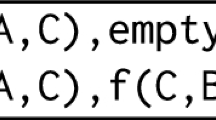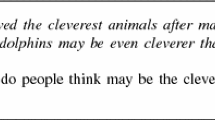Abstract
RTL is an algorithm designed to learn any number of simple, mutually dependent relations, producing recursive programs that are stratified in the sense given by Apt. In this paper, we present a revised algorithm and its implementation based on previous theoretical works that establish properties and limits of the learning framework. The algorithm is described both in abstract form and through an example. Emphasis is put on the way RTL uses induction and domain knowledge to guide the search towards specific kinds of hypothesis. The algorithm has been tested on three different domains obtaining encouraging results, as reported in the discussion. Finally, it is shown experimentally that the control strategy realized is somewhat independent of the order in which concepts are learned.
Preview
Unable to display preview. Download preview PDF.
Similar content being viewed by others
References
K.R. Apt, H.A. Blair, and A. Walker: “Towards a Theory of Declarative Knowledge”, in Foundations of Deductive Databases and Logic Programming, J. Minker (Ed), Morgan Kaufmann, Los Altos, CA, 89–148, 1988.
C. Baroglio, A. Giordana, and L. Saitta: “Learning Mutually Dependent Relations”, Journal of Intelligent Information Systems, 1, Kluwer Academic Publishers, 159–176, 1992.
M. Botta: “Learning First Order Theories”, Proc of the ISMIS-94, LNAI 869, Charlotte, NC, 356–365, 1994.
M. Botta, and A. Giordana; “SMART+: A Multi-Strategy Learning Tool”, Proc. of the 13th International Joint Conference on Artificial Intelligence, IJCAI-93, Chambery, France, 937–943, 1993.
L. De Raedt: Interactive Theory Revision, Academic Press, 1992.
L. De Raedt, and N. Lavrac: “The Many Faces of Inductive Logic Programming”, Proc. of the 7th International Symposium on Methodologies for Intelligent Systems, ISMIS-93, Trondheim, Norway, 435–449, 1993a.
L. De Raedt, N. Lavrac, and S. Dzeroski: “Multiple Predicate Learning”, Proc. of the 13th International Joint Conference on Artificial Intelligence, IJCAI-93, Chambery, France, 1037-1042, 1993b.
F. Esposito, D. Malerba, G. Semeraro, and M. Pazzani: “A Machine Learning Approach to Document Understanding”, Proc. of the 2nd Intenational Workshop on Multistrategy Learning, Harpers Ferry, WV, 276–292, 1993.
A. Giordana, L. Saitta, and C. Baroglio: “Learning Simple Recursive Theories”, Proc. of the 7th International Symposium on Methodologies for Intelligent Systems, ISMIS-93, Trondheim, Norway, 425–434, 1993.
J.U. Kietz, and S. Wrobel: “Controlling the Complexity of Learning in Logic though Syntactic and Task-Oriented Models”, in Inductive Logic Programming, S. Muggleton (Ed)., Academinc Pres, 1992.
N. Lavrac, S. Dzeroski, and M. Grobelnik: “Learning Non Recursive Definitions of Relations with LINUS”, Proc. of the 5th European Working Session on Learning, LNAI 482, Springer-Verlag, 1991.
R.S. Michalski: “A Theory and Methodology of Inductive Learning”, Artificial Intelligence, 20, 111–161, 1983.
S. Muggleton, and W. Buntine: “Machine Invention of First-order Predicates by Inverting Resolution”, Proc. of the 5th International Conference on Machine Learning, Ann Arbor, MI, 339–352, 1988.
S. Muggleton, and C. Feng: “Efficient Induction of Logic Programs”, Proc. of the 1st Conference on Algorithmic Learning Theory, Ohmsha, Tokio, Japn, 1990.
R. Quinlan: “Learning Logical Definitions from Relations”, Machine Learning, 5, 239–266, 1990.
B.L. Richards, and R.J. Mooney: “First Order Theory Revision”, Proc. of the 8th International Workshop on Machine Learning, Morgan Kaufmann, 447–451, 1991.
H. Shapiro: Algorithmic Program Debugging, MIT Press, 1983.
J. Wogulis: “Revising Relational Theories”, Proc. of the 8th International Workshop on Machine Learning, Morgan Kaufmann, 462–466, 1991.
Author information
Authors and Affiliations
Editor information
Rights and permissions
Copyright information
© 1995 Springer-Verlag Berlin Heidelberg
About this paper
Cite this paper
Baroglio, C., Botta, M. (1995). Multiple predicate learning with RTL. In: Gori, M., Soda, G. (eds) Topics in Artificial Intelligence. AI*IA 1995. Lecture Notes in Computer Science, vol 992. Springer, Berlin, Heidelberg. https://doi.org/10.1007/3-540-60437-5_5
Download citation
DOI: https://doi.org/10.1007/3-540-60437-5_5
Published:
Publisher Name: Springer, Berlin, Heidelberg
Print ISBN: 978-3-540-60437-2
Online ISBN: 978-3-540-47468-5
eBook Packages: Springer Book Archive




